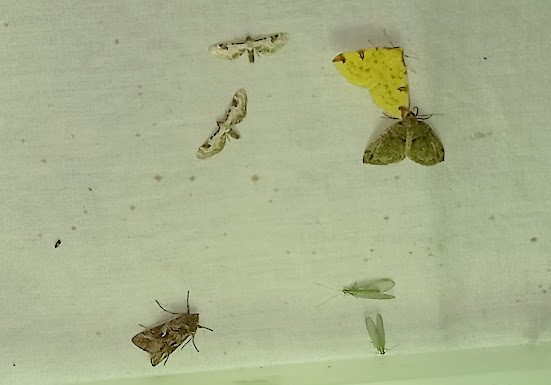Wednesday 13th July 2022.
As expected, it was a balmy and uncomfortably overnight where a restless sleep had me awake around 4.30am and then straight down to the moth box. There was a lovely pink sunrise this morning with some overhead clouds turning into that Herringbone effect by 5am, but I was going to have my work cut out as there seemed to be a lot of moths present this morning, especially on the white sheet!
There were a staggering 196 moths this morning of 59 species this morning! Phew! This took me over an hour to tally up and by a long way, the highest number of moths in a single morning to date this year. Incredible. A superb Pine Hawk-moth (my 5th Hawk-moth species for the year in the garden) was the icing on the cake and was discovered right at the bottom of my moth box too as I quickly took a few photos and placed it gently in one of my hanging baskets.
As well as the Pine Hawk-moth, other new for the year included Dingy Footman, Marbled Beauty, Marbled Green and the micro moths, Horse-chestnut Leaf Miner, Cosmopterix pulchrimella, Rush Veneer, Gypsonoma aceriana, Agriphila straminella, Ethmia dodecia, Batia lunaris and Cochylis atricapitana. The most numerous were Riband Wave and Lime-speck Pug and there were at least 15+ Bird-cherry Ermine counted, but I am sure there were quite a few more. At least around ten moths flew off before I had a chance to see them properly, which would push the number of moths to well over 200+. Apparently, the daily temperature is going to get hotter, peaking around Sunday / Monday and could get into the high 30’s!
Above, my first Dingy Footman of the year and below, my second Small Fan-footed Wave of the year and my first in the garden this year.
I did put a few moths on the Hants Facebook page hoping to get an ID and already one has come back as the micro moth, Anarsia innoxiella, which is not only new for the year, but also a new moth for me personally.
The following moths were present this morning:
- 1 Pine Hawk-moth (NFY)
- 30 Riband Wave
- 1 Swallow-tailed Moth
- 1 Bright-line Brown-eye
- 1 Common Emerald
- 17 Lime-speck Pug
- 1 Common Pug
- 5 Grey Dagger
- 3 Common Footman
- 5 Garden Carpet
- 1 Common Carpet
- 1 Maiden’s Blush
- 3 Willow Beauty
- 1 Small Fan-footed Wave
- 1 Brimstone Moth
- 1 Silver Y
- 1 July Highflyer
- 1 Green Pug
- 1 Dingy Footman (NFY)
- 6 Pale Mottled Willow
- 7 Double-striped Pug
- 1 Heart & Dart
- 1 Uncertain
- 3 Common Pug
- 1 Marbled Green (NFY)
- 1 Lackey
- 1 Marbled Beauty (NFY)
- 1 Large Yellow Underwing
- 15 Cherry-tree Ermine
- 8 Common Plume
- 3 Udea fulvalis
- 2 Blastobasis adustella
- 16 Apple Leaf Miner
- 3 Tachystola acroxantha
- 1 Crassa unitella
- 7 Anania coronata
- 4 Ephestia woodiella
- 8 Light Brown Apple Moth
- 3 Pyrausta aurata
- 1 Mother-of-Pearl
- 2 Horse-chestnut Leaf Miner (NFY)
- 2 Cosmopterix pulchrimella (NFY)
- 1 Oegoconia quadripuncta
- 2 Chrysoteuchia culmella
- 1 Beautiful Plume
- 1 Meal Moth
- 2 Rush Veneer (NFY)
- 2 Agriphila straminella (NFY)
- 1 Bud Moth
- 1 Swammerdamia pyrella
- 1 Eudonia mercurella
- 1 Celypha striana
- 1 Ethmia dodecea (NFY)
- 1 Gypsonoma aceriana (NFY)
- 1 Blastobasis vittata
- 1 Batia lunaris (NFY)
- 1 Codling Moth
- 1 Cochylis atricapitana (NFY)
- 1 Anarsia innoxiella (NFY & lifer)
- 1 Calamotropha paludella (NFY & lifer)













No comments:
Post a Comment